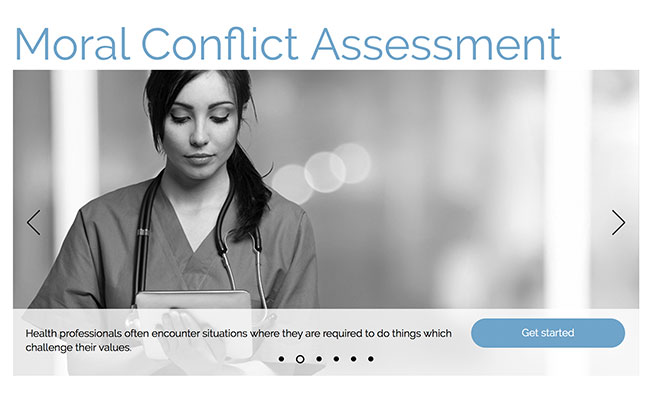International Self-Care Day, taking place July 24th, emphasizes that self-care has benefits that can be experienced all day, every day—24/7. The importance of self-care is not lost on CHÉOS Scientist Dr. Peter Dodek who has been leading research on stress and burnout in health care professionals. His research focuses mostly on a common source of stress among health care professionals in the intensive care unit (ICU), moral distress. This is the stress that occurs when what someone is told to do is in conflict with what their conscience tells them to do.

Moral distress encompasses the feelings of anger, frustration, guilt, and powerlessness that health care professionals experience when they are unable to practice according to their own ethical standards, which has very real implications, as Dr. Dodek’s previous qualitative and quantitative research found. Moral distress can have profound emotional effects, impacts on interprofessional dynamics, and repercussions for patient care and safety. There are also costs of losing staff as a result of moral distress, especially common among nurses, associated with training and integrating new members into a team. These preventable costs are what Dr. Dodek describe as “a tragedy for the system,” and have motivated him to search for ways to mitigate moral distress.
Moving from Moral Distress to Moral Action
Bringing together an international multi-disciplinary team of clinicians and social scientists, including CHÉOS Scientists Drs. Najib Ayas and Rick Sawatzky, Dr. Dodek hopes to empower individuals to take action to move out of a place of moral distress. Backed by a CIHR Operating Grant for integrated knowledge translation projects, the research team mobilized the knowledge from their previous work for the challenging task of crafting an intervention to manage moral distress.
“The causes of moral distress are things like controversies in end of life care, questions about competency of colleagues, communication issues, leadership issues; those kinds of issues which are complex, ones that are not straightforward or easy to fix” said Dr. Dodek.
To adequately address the multifaceted causes of moral distress, the team turned to participatory action research (PAR), an approach that involves engaging people who are experiencing a problem in developing, testing, and evaluating solutions to it. Such an approach contrasts with ‘traditional’ ways of doing research where scientists do research on a group of people, rather than with them. Bringing the participants into the research process helps to ensure that the research is relevant and applicable to participants’ lived experiences and that the action that comes from it will fit their unique circumstances.
“I can’t tell you how to fix your moral distress. The whole idea of this exercise is for you to work through it because it will be more compelling to you if you come up with [the solution],” noted Dr. Dodek.
Participants will be able to arrive at new solutions using a new tool called Moral Conflict Assessment (MCA) that was developed by one of the project partners, Professor emeritus of Sociology and Anthropology at Carleton University and expert in PAR Dr. Jacques Chevalier. The MCA online tool is open to anyone to use, but Dr. Dodek and his team are specifically testing out the MCA in three ICUs in B.C. At each site, administrators, physicians, nurses, respiratory therapists, and other health care professionals will use the MCA tool to better understand and overcome morally distressing situations.

How MCA works
MCA is accessed through a confidential website and consists of eight steps that break down a moral distress problem and help generate solutions. In doing so, it aims to improving participants’ resiliency by increasing the extent that participants put effort into looking after themselves, analysing and thinking through the situation causing them distress, and taking meaningful action to address it. Participants are guided through the process by blurbs and videos that explain each component and visual representations including tables, graphs, and word clouds are produced as participants make their way through each step.
In the first step of MCA, participants are prompted to describe their problem, the effects it is having on them and their work, and what they are currently doing about it. Participants continue to unpack their moral conflict by breaking down how a situation might cohere or conflict with values, self-interests, or identity. They then identify existing factors that either help or hinder them from acting according to their values. Participants prioritize these existing factors for action based on how important and modifiable they are. Based on the work in previous steps, they can think up new coping strategies as well as metrics to measure their success in easing their moral conflict. Finally, participants are prompted to reflect on the process of using MCA and can save a summary of their assessment.
“The idea is that by having worked through it, you have some prompts for ideas of what you could do differently, but also things that could be different in the system,” said Dr. Dodek. “We do recognize that there is a lot of system change that is required.”
The back end of the website connects to a database that collects and aggregates information from the individual assessments, without identifying the participant. Basic built-in query and analysis functions will enable the research team to look for relationships or trends at the end of the study and will also be a source for developing solutions for preventing moral distress on an individual and systemic level.
“System intervention will hopefully be prompted by letting the leaders know what their staff are saying,” Dr. Dodek said. “By aggregating findings from each hospital or ICU, the leaders at that hospital can see what the major causes of moral distress are and what people suggest to be done.”
The researchers have already presented results to one of the hospitals. The last phase of the project will be to evaluate the utility of MCA for dealing with moral distress in the long-term using focus groups at each of the three hospitals and is expected to take place next year. Work in progress on this project has been presented at the CHÉOS Work in Progress Seminars and the 2017 Canadian Bioethics Society meeting. A current update will be presented this fall at the 2018 Canadian Healthcare Workforce Conference.
Dr. Dodek is also involved with a number of other related projects using surveys to gain a better understanding of aspects of moral distress and positive attributes like resilience, coping strategies, and compassion satisfaction and fatigue among medical students, residents, and intensive care physicians. An earlier study completed with CHÉOS’ Dr. Hubert Wong surveyed internal medicine residents at UBC on moral distress and burnout. Dr. Dodek recently presented on moral distress at a Summit on Burnout in ICU Professionals, hosted by the Society of Critical Care Medicine.



